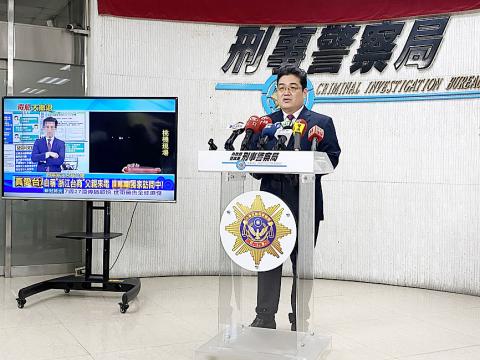Authorities have investigated 178 cases of alleged misinformation regarding COVID-19, 45 of which were created by Chinese cyberwarfare units with the aim of disrupting efforts to contain the disease and undermine Taiwan’s national security, the Criminal Investigation Bureau said yesterday.
Of the 178 cases investigated from Jan. 23 to yesterday, 78 cases involving 112 people have been forwarded to prosecutors for indictments, including the proven falsehoods of “President Tsai Ing-wen (蔡英文) was rushed to a hospital for treatment after contracting the Wuhan virus” and “Taoyuan has imposed restrictions and locked down the city,” bureau Deputy Commissioner Chu Tsung-tai (朱宗泰) said.
Investigators found that overseas Internet Protocol (IP) address were used in 45 cases, Chu said, adding that because of their use of simplified Chinese characters and phrases commonly used in China, they were most likely the work of Chinese netizens and cyberwarfare units.

Photo: CNA
Chu cited as an example a person using the name Zhang Xiang (張湘) with an IP address in China’s Hebei Province last week circulating on Facebook a doctored image, which purportedly showed a decree bearing the seal of Taoyuan Mayor Cheng Wen-tsan (鄭文燦) ordering that all traffic and public transportation be locked down and prohibiting residents from leaving the city due to an outbreak of the coronavirus.
Fourth Investigation Corps Captain Lin Chih-cheng (林志誠) said that another IP address in China was last week used to disseminate a message that “there are more than 817 confirmed Wuhan virus cases in Taiwan and more than 500 deaths, with the outbreak especially severe in Pingtung County and Tainan.”
Such messages originating from IP addresses in China are easily identified as part of a deliberate misinformation campaign due to their sensational claims and conspicuous inaccuracies, which can be readily fact-checked through local media reports and government information, as well as their use of simplified Chinese characters and common Chinese phrases, Lin said, adding that sharing the messages on social media could result in criminal prosecution.
Lin cited as an example a 26-year-old Taichung resident surnamed Chang (張), who was on Tuesday questioned by prosecutors and faces charges for spreading rumors related to the virus situation punishable by up to three years in prison and an NT$3 million (US$99,973) fine.
Chang had posted on a popular gaming chat site a message traced to China saying that the “armed forces have placed Taipei under military control as the virus situation escalates,” which was accompanied by a photograph of the 1989 Tiananmen Square Massacre’s “Tank Man,” Lin said.
“When detained by Taichung police on Monday, Chang said that he did not create the message, but failed to verify its content before forwarding it to friends and posting it to the site,” Lin said.
Chinese cyberwarfare units have capitalized on the epidemic and redoubled their misinformation efforts to disrupt Taiwan’s disease-prevention efforts, sow confusion, cause distrust of official communications by health authorities and undermine national security, Lin said.
The bureau said that prosecutors have also questioned a man in Changhua County for allegedly spreading rumors, as he called in to TV talk shows to discuss the epidemic and defend his son, a businessman working in China who returned to Taiwan recently, which was deemed as providing misleading information to the public.

Taiwan is stepping up plans to create self-sufficient supply chains for combat drones and increase foreign orders from the US to counter China’s numerical superiority, a defense official said on Saturday. Commenting on condition of anonymity, the official said the nation’s armed forces are in agreement with US Admiral Samuel Paparo’s assessment that Taiwan’s military must be prepared to turn the nation’s waters into a “hellscape” for the Chinese People’s Liberation Army (PLA). Paparo, the commander of the US Indo-Pacific Command, reiterated the concept during a Congressional hearing in Washington on Wednesday. He first coined the term in a security conference last

Prosecutors today declined to say who was questioned regarding alleged forgery on petitions to recall Democratic Progressive Party (DPP) legislators, after Chinese-language media earlier reported that members of the Chinese Nationalist Party (KMT) Youth League were brought in for questioning. The Ministry of Justice Investigation Bureau confirmed that two people had been questioned, but did not disclose any further information about the ongoing investigation. KMT Youth League members Lee Hsiao-liang (李孝亮) and Liu Szu-yin (劉思吟) — who are leading the effort to recall DPP caucus chief executive Rosalia Wu (吳思瑤) and Legislator Wu Pei-yi (吳沛憶) — both posted on Facebook saying: “I

Sung Chien-liang (宋建樑), who led efforts to recall Democratic Progressive Party (DPP) Legislator Lee Kun-cheng (李坤城), was released on bail of NT$80,000 today amid outcry over his decision to wear a Nazi armband to questioning the night before. Sung arrived at the New Taipei District Prosecutors’ Office for questioning in a recall petition forgery case last night wearing a red armband bearing a swastika, carrying a copy of Adolf Hitler’s Mein Kampf and giving a Nazi salute. Sung left the building at 1:15am without the armband and covering the book with his coat. Lee said today that this is a serious

A mountain blaze that broke out yesterday morning in Yangmingshan National Park was put out after five hours, following multi agency efforts involving dozens of fire trucks and helicopter water drops. The fire might have been sparked by an air quality sensor operated by the National Center for High-Performance Computing, one of the national-level laboratories under the National Applied Research Laboratories, Yangmingshan National Park Headquarters said. The Taipei City Fire Department said the fire, which broke out at about 11am yesterday near the mountainous Xiaoyoukeng (小油坑) Recreation Area was extinguished at 4:32pm. It had initially dispatched 72 personnel in four command vehicles, 16